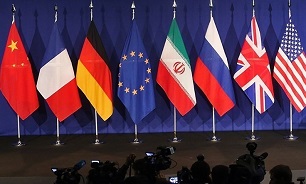European Envoys Take Fight for JCPOA to US Congress
 The British, French, German and European Union ambassadors
to the United States were expected to participate on Wednesday in a meeting on
Capitol Hill with Democratic senators organized by the Senate’s number two
Democrat, Richard Durbin, congressional aides and embassy officials told
Reuters.
The British, French, German and European Union ambassadors
to the United States were expected to participate on Wednesday in a meeting on
Capitol Hill with Democratic senators organized by the Senate’s number two
Democrat, Richard Durbin, congressional aides and embassy officials told
Reuters.
Former Undersecretary of State and lead Iran negotiator Wendy Sherman will also attend and former Energy Secretary Ernest Moniz and Treasury Secretary Jack Lew will participate via videolink, an aide to Durbin and another congressional aide said.
The meeting is part of an ongoing effort by Democrats in Congress and other officials who support the nuclear pact to bolster support for the deal by spelling out the consequences of its collapse as Republican President Donald Trump faces an Oct. 15 deadline for certifying the agreement or placing its fate in the hands of Congress.
A British embassy official said Ambassador Kim Darroch was in Congress on Wednesday with his French, German and EU counterparts meeting with both Democrats and Republicans "to provide information on the European position on the JCPOA”.
An EU embassy spokesman confirmed that EU Ambassador David O‘Sullivan and others would attend, to explain that the deal is a multilateral agreement that is working and that the European Union will do everything it can to ensure it stays in place.
Senior White House officials have said that Trump is leaning toward a course of action that could lead to the United States abandoning the pact, despite apparent disagreement within his administration over whether that is the best way forward.
A senior administration official said the administration was considering Oct. 12 for Trump to give a speech on Iran but no final decisions have been made.
The ambassadors have said the deal’s demise would be a major loss that could lead to increased enrichment by Iran and weaken international proliferation efforts as the world grapples with a growing nuclear threat from North Korea.
Iran has said it may abandon the nuclear deal it reached with the major world powers if the United States decides to withdraw from it.
Last month, Trump, during an address before the United Nations General Assembly, said, "The Iran deal was one of the worst and most one-sided transactions the United States has ever entered into frankly that deal is an embarrassment to the United States, and I don't think you've heard the last of it”.
Iran and the Group 5+1 (Russia, China, the US, Britain, France and Germany) reached the 159-page nuclear agreement in July 2015 and implemented it in January 2016.
Since the historic deal was signed in Vienna, the International Atomic Energy Agency (IAEA) has repeatedly confirmed the Islamic Republic’s compliance with its commitments under the JCPOA, but some other parties, especially the US, have failed to live up to their undertakings.
